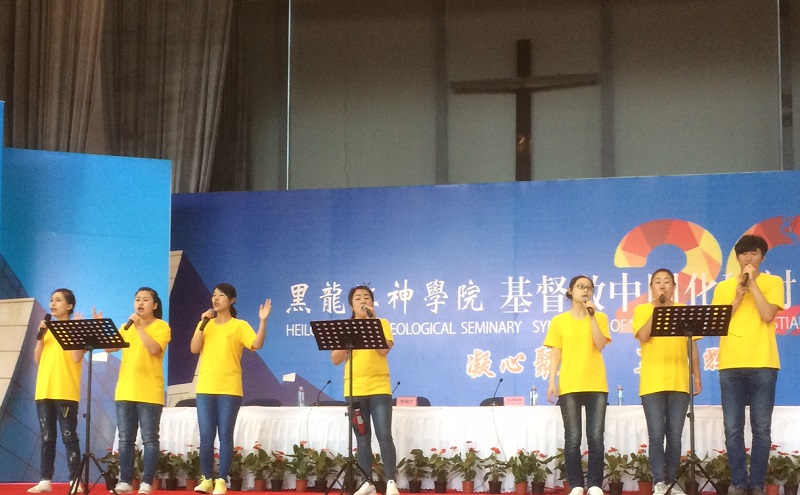Some China-watchers have been reporting increased persecution of Christians throughout the country. I saw no sign of that kind of thing, however, last month when I visited Harbin, a city of ten million in the northeastern province of Heilongjian. And my time there was all about religion.
A thousand folks gathered at the Heilongjian Theological Seminary for a two day celebration of the school’s twentieth anniversary. Buddhist and Muslim leaders were present, along with government officials. The mood was festive and overtly worshipful, as a “worship team” of seminary students led the gathering in songs of praise.
The seminary’s president, Dr. Lü Dezhi, and the vice president, Dr. Li Meilan (they are husband and wife), are also senior pastors of Harbin’s Hallelujah Church, an 11,000 member congregation whose worship services feature, along with serious “teaching” sermons, several choirs, instrumental groups, and dramatic skits. Dozens of volunteers from that church helped to staff the seminary’s anniversary celebration.
Again, no sign in any of that of an anti-religion campaign. My own experience with government officials over twenty or so visits to China in the past few decades has always been cordial. Two staff members from the State Administration for Religious Affairs even spent a term a few years ago auditing courses on our Fuller Seminary campus in Pasadena. When a local Party leader came up to me to ask for a photo together after my plenary address to this anniversary gathering in Harbin, I took it as yet another friendly gesture.
In fact, friendliness toward religion has been a matter of official policy in recent years. In 2007 the government’s 17th Party Congress called for religious groups “to actively participate in building up a harmonious society.” Around that time a young government official explained that policy to me in terms of his own personal story. When he first started his training for government service, he said, he was taught that “religion is a bad thing and it should be eliminated.” Later, when he had his first assignment, the position changed to “religion can’t be eliminated, so it should be tolerated.” Today, he said, the Party is convinced that “we need religion to help us promote social harmony in China.”
But again, I have been reading reports from China-watchers over the last year or so of a return by the government to a more hostile approach to religion. And I have no doubt that some of the incidents cited in these reports are true. One pastor I know, for example, has been under house arrest in recent months — for trumped-up charges, my Chinese friends tell me — and he has recently been imprisoned again. That kind of disturbing thing has happened all along in local situations. So when I set out on this most recent visit to China, I was eager to see whether I would discover evidence of a new national policy of systematic persecution of the Chinese churches.
I was fortunate to happen upon a European scholar who has been visiting Protestant and Catholic groups all over China for the last eight months. He told me that he was witnessing considerable growth and vitality in local worshiping communities. And he was surprised to observe in conversations with local religious leaders — he is a fluent speaker of Mandarin — that they see do not see President Xi Jinping as hostile to Christianity as such. Xi is working, the religious leaders have told him, for reforms that would control the forces that have been unleashed by the expanding market system. In these efforts he faces opposition from one group within the Party who favor much more stringent controls, as well as from another contingent who want no new restrictions at all. Given these dynamics, it is important for the Chinese president to keep the pressure on elements in the culture that could make him look weak. Thus his message to religious groups: Don’t do things that will make me impose more restrictions.
The scholar went on to raise, though, a more urgent factor for the government’s regulation of religious groups — he called it “the growing Pakistan problem.” While the Muslim minority in China has long been a stable presence, Islamic extremism has begun to show its face. Muslim families with newly gained wealth have been sending their teenagers to elite high schools in Pakistan, where radical ideas are often the rule of the day. Their offspring come home with sympathies for extremist notions, which has the government worried. This in turn has implications for the treatment of all of the religious groups in China, since the government does not want to appear to be especially heavy-handed in its treatment of Muslims.
I did not want to rely solely on the impressions of another Western visitor to China, so I checked things out with a couple of younger Chinese Christian leaders—folks who are well-connected with peers in other regions in China. I raised the issues with them by asking for help: “People back home are saying that Chinese Christians these days are experiencing increasing persecution. How should I answer them?”
The responses were captured succinctly by one young woman, a church worker in Harbin who also teaches at the seminary. “Persecution? No, not that. But there is increasing pressure.” And in explaining the factors that give rise to the new pressure, she cited — as did some others — the same factors reported by the European scholar.
What impressed me in all of this was the notable absence, at least among the Harbin Christians with whom I talked, of a sense of victimization. No persecution complex — but, yes, some new “pressure.” But not of the sort that detracts from a mood of experiencing new opportunities.





